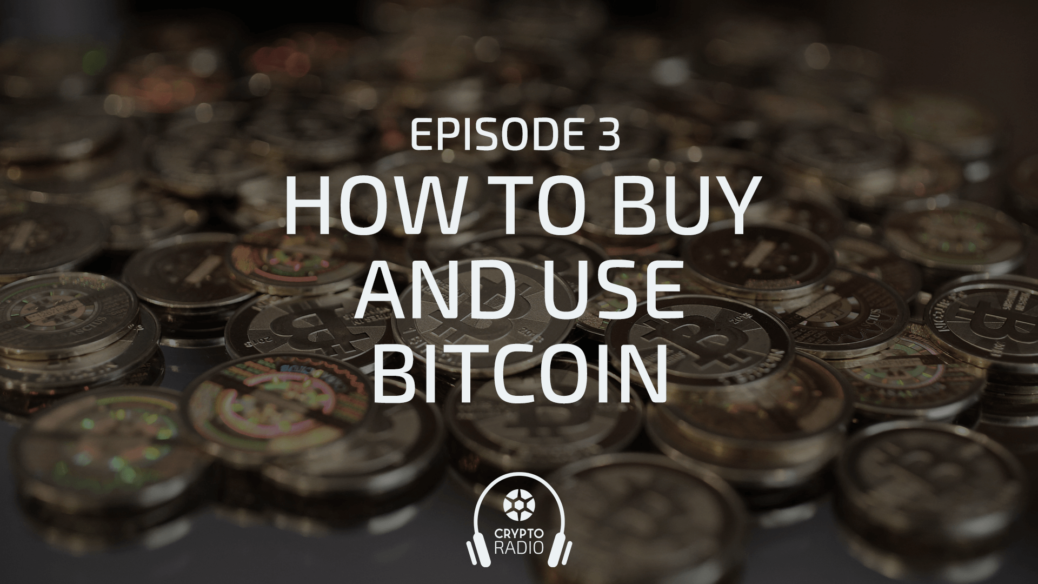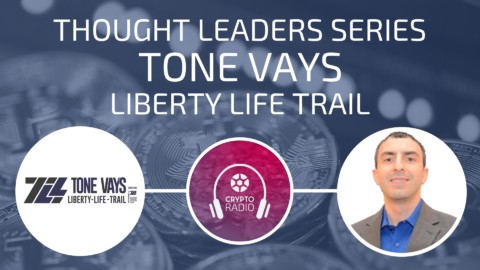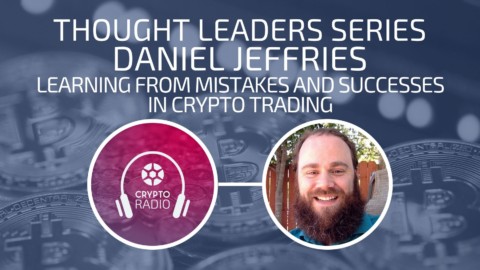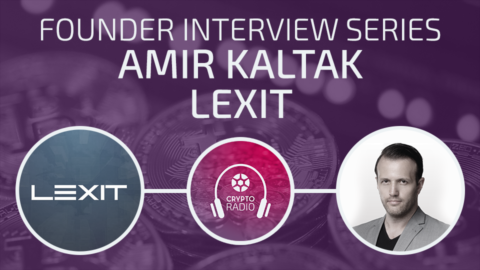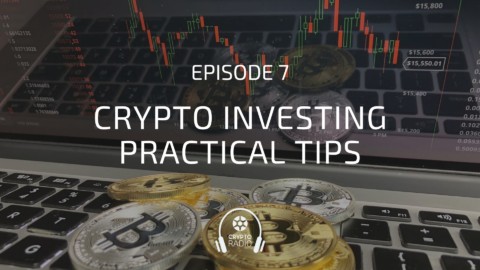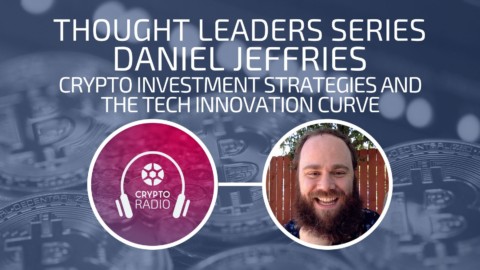Podcast: Play in new window | Download
Welcome to Crypto Radio. We interview top thinkers and entrepreneurs in the cryptocurrency and blockchain industry. We also cover topics like investing, trading, and ICOs. We’re your hosts Mike Gilliland, Michael Paul, Chris Sparks and Euvie Ivanova. We’re entrepreneurs, crypto investors, and co-founders of a new blockchain investment platform called cosyndicate.io. We created cosyndicate and Crypto Radio to make crypto investing a better experience for you. In the first few episodes of this podcast we’re going to cover the basics of Bitcoin, [00:00:30] blockchains, and crypto investing.
If you’re new to the space, these episodes are for you. If not, skip ahead to the episodes where we start to interview founders of blockchain projects and update you on all the news and important events in the crypto world. Over the next few episodes we’re going to be running a context to give you a chance to win over $3,000 worth of prizes, including cosyndicate tokens and a free membership to a private investment mastermind group. To learn how to participate, go to cryptoradio.io.
Chris: A lot of people want to get into Bitcoin. [00:01:00] A lot of people don’t know how to get into Bitcoin. Maybe we can tell the audience how to make that spearhead entry into the world of cryptocurrency. What ways would you guys suggest actually getting into and purchasing Bitcoins?
Mike: So, there’s a few ways and it actually really depends on where your citizenship is, where your residency is because there’s different exchanges for every country. The best thing to have a look is just to like, I think buybitcoinworldwide is a very good website, buybitcoinworldwide.com. You can put in your country of where you are and it will show your options, and then you can just look for reviews and see which ones are the most credible.
[00:01:30] So, there’s big ones like Coinbase that have, you know, exchanges in lots and lots of countries, that’s the most popular one. But they’re not necessarily the best in terms of like spreads. You’ll end up paying more of a premium than maybe other exchanges that have, you know, better rates.
Michael: For us, in our business, we just started accepting cryptocurrencies and built up pretty much all of it from that. I think it took about two weeks to sign up for some of the exchanges that you signed up for Euvie, and it required like passports and a lot of identification.
Euvie: Yeah.
Michael: But once that was done, then we were signed up and we can buy cryptocurrencies with Fiat or different [00:02:00] other cryptocurrencies.
Euvie: Yeah, and also, if people want to get it with cash rather than signing up with a bank account and having their identification associated with it, they can use local Bitcoins. Which is actually one of the oldest methods of buying Bitcoin, and you just find somebody in your area who wants to sell Bitcoin for a certain rate and then you just meet up in person and exchange it for cash.
Michael: Generally, there’s tons of people doing that now. Like, we’ve been able to do that pretty much anytime we’ve requested. Like, if you’re offering to sell Bitcoin to friends, there’s always someone to buy it and there’s always [00:02:30] someone to sell it to.
Chris: Have you ever physically made a Bitcoin transaction? Like, in real life with another person?
Euvie: Yeah.
Michael: Yeah, tons.
Euvie: Only with friends though.
Chris: Really?
Euvie: Yeah.
Chris: I never thought that that was actually a real thing that happens.
Michael: Yeah, our first ether or our first blockchain Ether meetup in Plovdiv someone bought a sandwich with Ether at the meetup. Yeah.
Chris: Wow, that’s great.
Mike: Is that like a Bitcoin pizza?
Michael: Yeah, yeah. Oh my God I don’t want to tell him how much that’s worth now. It was an expensive sandwich.
Chris: An $83,000,000 pizza?
Michael: I think the fourth way is probably to do Bitcoin mining which we talked about.
Euvie: [00:03:00] But that’s a lot more involved now, yeah.
Michael: Yeah, we kind of talked about it in the last episode a bit.
Euvie: So, you know, a couple of years ago it would have been feasible for an individual to get into Bitcoin mining quite easily without a lot of upfront capital. But now that the difficulty of the mining process has increased, now people have to invest a fair amount of money to actually get started with Bitcoin mining. So, we wouldn’t recommend it for beginners.
Michael: I’m wondering, maybe you know this Mike, if mining Altcoins is actually worth it?
Mike: Yeah, I mean there’s a whole industry there. [00:03:30] Again, it’s a bit more niche, it’s a bit more technical. Not everyone’s going to have the skillset. But, essentially, if you have cheap electricity you may want to look into it as an option for mining Altcoins that are maybe, you know, right now quite cheap and, again, will grow in value just like Bitcoin and Ethereum have. So, yeah, the top coins right now are very, very competitive. They’re very hard to break into.
Chris: On a daily basis, if I want to be like Andreas Antonopoulos and use Bitcoin as my main currency, how hard would it be to live that way? How hard is it to make Bitcoin payment?
Michael: We’ve actually lived off of Ether for more than a year now. [00:04:00] So, we’ve compensated employees that way, we’ve been paid nearly 100 per cent in Ether this year, and generally, like I said, we will sell it for cash with friends or do exchanges or direct deposits to the bank. So, it’s been quite easy.
But one thing I would recommend, and I know Andreas Antonopoulos recommends this as well, is getting a debit or visa card that links to your Ether or PayPal wallet and that will make things a lot easier. So, you just top up your card and then you can spend it exactly like you would a visa.
Euvie: Yeah.
Chris: Can you recommend any particular cards?
Michael: [00:04:30] We don’t actually use any, so I’m not really sure. Maybe you know.
Mike: I think there’s some good ones coming out. I think TenX is one most people know about, but they’re behind on their shippings. There’s just way more demand than they have, you know, supply. The few ones coming out actually, one that we’ll be having soon I think is STK, which is a new one. But, yeah, it’s very new technology so it’s not like there’s a lot of maturity in that sector yet.
Euvie: As far as making Bitcoin transactions on a daily basis, there’s still not that many places online that accept Bitcoin. But there are more and more all the time and we will see them getting integrated into things like [00:05:00] Amazon within the next couple of years probably.
Mike: I think it’s also important to differentiate like the evolution of this, because, you know, a couple of years ago you could do Bitcoin transactions quite fast and cheaply and that’s not the case anymore. So, as like end of 2017/2018 when we’re recording this, it’s actually very expensive proportionally to send payments for small things. You wouldn’t really do it and it takes a long time to confirm, just because there’s way more demand. So, obviously there could be changes in the blockchain to make those payments faster on Bitcoin. Or, people will just move to using other types of payments like Litecoin which are a lot, you know, faster and cheaper for small transactions.
Michael: [00:05:30] The restaurant we were at yesterday for dinner actually accepts a whole range of cryptocurrencies, but I think that, yeah, people were accepting that and then now they’re going away because the transaction speed is so much slowly than it used to be…
Euvie: And the fees.
Michael: And like you said, the price is quite high. But I don’t know what the transaction fees are going to be like on Litecoin.
Mike: It’s a lot faster right now. Obviously, there’s less transactions or demand on the Litecoin blockchain and I think they’re just slightly ahead in terms of, you know, development. So, I think they will stay ahead in terms of speed, that’s my personal theory, but we’ll see what happens.
Euvie: [00:06:00] So, it seems like right now, at the time of recording, Bitcoin is more suitable to use like a savings account basically. It’s a long-term storage of value.
Mike: It’s just like digital gold. You don’t spend your gold for a coffee, right?
Chris: Yeah, exactly. Three days ago, I had a Bitcoin transaction that cost $38 and took 4 hours, which is insane.
Michael: Yeah, you’re not going to be buying coffees with that.
Chris: Yeah, not a chance. It’s also prohibitive that actually when you try and convince someone, like, this is a great technology and then you sit down and you try and like, you know, send them some Bitcoin and then it takes – you’re sitting there watching, you know, twiddling your thumbs for two hours straight.
Mike: [00:06:30] Not the best one to start with to evangelize people on there.
Chris: Exactly, yeah. So, if I was to transfer Bitcoin to someone, it would be, for example, on a mobile device with a Bitcoin app. But is it possible to actually lose Bitcoin?
Euvie: It’s basically when you lose access to your private keys, that’s one of the ways that you can lose Bitcoin. So, like if you can’t access your wallet, the Bitcoins are always going to be there on the blockchain, but you can lose access to them.
Chris: Right.
Michael: So, you could lose your password, forget your recovery seed, [00:07:00] or lose the paper where you’ve got it written down. There’s been a lot of hacks in the recent year with multi-signature wallets, so that’s a bit problem. Generally, you want to keep your Bitcoins and your cryptocurrency stored on hardware wallets and only connect them when you’re making trades or transfers.
Euvie: Yeah, so hardware wallets, also known as cold storage, are a physical device. It looks like a little thumb drive, and most of the time it’s not connected to your computer and it’s not connected to the internet. And anytime you want to make a transaction with it, you actually have to plug it into your computer.
Michael: But the thing that people get confused about [00:07:30] with these wallets, hardware wallets, is they think that Bitcoins are actually stored on the wallet. That’s not the case. They’re not stored on hard drives, they’re not stored on wallets. What you’re storing on the hard drive or the, you know, hardware key/wallet, is your keys to access your part of the blockchain that contains your wallet and your coin. So, you’re basically losing the keys to the wallet, but the wallet is actually…
Euvie: It’s always there, yeah.
Chris: So, basically the way that I like to think about it, so you’ve got a hardware device like a thumb drive that you connect to your computer which gives you access to your private keys that [00:08:00] allows you to move Bitcoin around and transfer the ownership of the Bitcoin to other people. And then what you also have is any number of backups, which is I think in the case of Trezor is 16-word phrase.
And some people I’ve heard of go so far as to actually etch it into aluminium, cut the aluminium piece in half and then hide one in one place, like in their backyard, and put the other half in a bank vault or something like that. But, yeah, the way that you backup these private keys is actually to, yeah [00:08:30] write it down on a physical piece of paper. And you can do that an unlimited number of times, however, of course the more times you do it the bigger your risk profile.
Mike: Yeah, if you can memorize in your head is the best way with some kind of pneumonic, but obviously that’s just a bit more work. If you have a lot of money, it’s probably worth it. So, just depends on how much Bitcoin we’re talking about. It’s also a good exercise to imagine you actually lose your wallet and then how would you actually restore it. And do that first before you put a lot of money on it, otherwise it might just be more complicated in the future. You should have done that at least first, before you set the device up.
Chris: Yeah, definitely. Because the user experience [00:09:00] on these things right now is not so great. I mean, the people like us who have to explain this to people, they’re not doing us any favours let’s put it that way. When it comes to usability.
Michael: I don’t know that it can really get much easier though, because you’re taking so much of the bank responsibility on your own shoulders. So, there needs to be these security measures in place, and there needs to be a level of complexity to it that, you know, to ensure that it’s secure. I don’t know that it’s going to get that much simpler over time.
Euvie: Maybe just more streamlined and, you know, better explained and better user-layout to show you what to do.
Mike: [00:09:30] I think it will become more user-friendly, for sure.
Michael: Yeah, you do?
Chris: It can’t get harder, I guess that’s what I’m trying to say.
Euvie: We will talk about this more actually in a couple of episodes from now, about the security precautions that you need to take when transferring and storing your Bitcoins or other cryptocurrencies.
Chris: Michael, I wanted to get back to what you just said because it reminded me of something that I heard about a year and a half ago. If you memorize your private key, what you can essentially do is cross a border with billions and billions and billions in your head.
Michael: Exactly.
Chris: That was something that kind of [00:10:00] was like one of those, “Holy shit,” moments for me.
Mike: People also injecting RFID chips into their skin and doing it that way. So, I mean, there’s all kinds of innovative ways of doing it.
Michael: That seems like a lot of extra steps rather than just memorizing 20 words.
Mike: Depends how much you trust your memory, yeah.
Chris: Get it etched into your DNA.
Michael: Yeah, no kidding.
Chris: I mean, that’s pretty hardcore. So, how about consumer protection when it comes to Bitcoin? Again, there’s no centralised authority that regulates this or oversees any of it. So, what’s the equivalent of consumer protection in the Bitcoin world?
Michael: Well, you can just hand over your wallet [00:10:30] and keys to some trustworthy guy in the street who promises to take care of it for you and you’re good.
Chris: Like a banker, for example.
Mike: I think it depends on what format we’re talking about, like where you’re storing your coins. And not just Bitcoin, there’s other coins, as well, right? So, if you’re storing on an exchange and that exchange is regulated and licensed, you have a little bit more support, you know, if you need help to get out. Or, you know, if you think someone hacked into your account or something. So, if you’re storing it by yourself then there’s no one to really help you, you know, and if you’ve just made a mistake and your device is still working, you can probably get support from the hardware manufacturer. [00:11:00] But, you know, if you genuinely lost the private key, there’s really no recourse.
Chris: Yup. So, Michael, would you recommend leaving your Bitcoins on an exchange?
Michael: I think it’s generally not a good idea. There’s been a lot of obviously, issues and hacks in the past. So, I wouldn’t say any exchange is beyond, you know, risk. There is obviously counterparty risk there. And that’s the whole point with cryptocurrency, is you’re trying to remove that counterparty risk of who’s holding your money and you really want to hold onto it as much as possible. The only real scenario is where you need to have Bitcoin on an exchange right now is just for liquidity, if you want to trade it. So, obviously when you’re purchasing and buying and selling, [00:11:30] that’s when you need to have the liquidity.
But beyond that for Bitcoin, if you’re just holding it long-term, there’s almost no real reason or need to have it on exchange, except that it’s more user-friendly. So, if people are just lazy, they’ll just leave it on exchange. But they won’t appreciate the risk that they’re doing that, because they just think, “It always will be there.” But there’s always an opportunity for hackers to get in and some exchanges are just very, very shady anyway, so you wouldn’t want to leave your money on there and trust them with too much for too long. So, buy it there and get it off as soon as you can, and then obviously when you need to buy and sell you put it back on.
Euvie: Yeah, and sometimes exchanges to freeze withdrawals for various reasons. [00:12:00] So, even though like you might have access to your Bitcoins, you know, after a few days. But let’s say, if you wanted to sell it or, you know, send it to someone else, it might get frozen for various reasons. Like, for example, when China announced that they were going to have regulations for cryptocurrencies, a lot of exchanges froze withdrawals. Or, if they have too much volume going on, they might sometimes freeze withdrawals. So, that’s something to be aware of, as well.
Chris: And let’s be clear actually, just to remind the audience that it’s not actually [00:12:30] the blockchain or Bitcoin that’s hackable. But the things around it and the things that people build are not impervious to hackers and malicious action. When you put your money onto an exchange, what you’re doing is giving custody of that money to the exchange and then they’re putting it into a big wallet on the exchange with, you know, 50/100,000 Ether or Bitcoin. and then they’re keeping track of how much you own that’s in that wallet. But if that wallet gets hacked, you are SOL again. And we have to remember also that these are all start-ups. [00:13:00] All these exchanges are very, very new. I think only Gemini is actually insured.
Mike: Probably the safest one, yeah.
Chris: Yeah, so we’re still early stage and some people might still be on the fence. I’d like to maybe go over a couple of reasons why you should use Bitcoin. Why should somebody at this stage, with the problems with the UX, actually start getting into it now?
Mike: I think we’ve talked a lot about the problems and actually there’s also opportunity there, because when something’s difficult to use at that very early adopted stage (?) it just means there’s, you know, you’re getting in earlier. So, if you think the technology [00:13:30] has potential and you learn how to use it sooner, you’re going to be at an advantage, you know, down the road in a year or two years when it becomes more popular and mainstream. Just like people who are getting in now are paying a lot more for Bitcoin than they were, you know, two, three years ago when no one knew about it. So, I think that’s the first advantage, just being more comfortable with the technology.
I think once you know how to use it and play with it, it becomes very real. Whereas, otherwise it’s just theory. Once you actually get a device, start to buy and sell, it becomes very tangible. You realize the value of it and you use cases of it. So, if you need to send money to a friend overseas, for example, you know, that’s a good use case. And we all have friends [00:14:00] all over the world now. So, there’s dozens and dozens of reasons why you might want to use it. To protect your wealth, to send money around freely and easily without regulation, without middle men fees. So, I think it just depends. For everyone it’s different. But just getting your hands on it now and playing with it early, to be ready when, you know, it becomes more mainstream.
Chris: In five years, this world and understanding this technology is going to be so complex with several additional layers of complexity added to how complicated it is now. To get into it right now is a good idea, basically. It’s like the internet [00:14:30] in 1993 when things are still digestible. If you don’t get into it now, you risk kind of being left behind on the understanding of what’s going to be happening and how things work in the background.
Mike: Yeah, sorry, I’m not sure I agree with the complexity growing. I think that the landscape keeps evolving, there’s more use cases. But I think it will actually become more user-friendly as more people use it. Because that’s one of the biggest problems to mainstream adoptions. That’s what a lot of companies are working on. And I think that it’s not that you won’t be able to use it, it’s that you’ll pay a much higher price. Because it will just be more demand. So, obviously it’s something that comes easier to use, [00:15:00] more people use it the demand goes up and therefore the price goes up.
Chris: It’s just worth it for people to start paying attention now, because how many people really could tell you how the inner workings of the internet actually work?
Mike: It’s because there’s so many abstractions being created. So, since the internet, I mean, all you need to know is how to plug in an address in a web browser and go to someone’s address. And that was actually a complicated thing at the time to teach people. Now, there’s so many abstractions like Facebook and people are becoming experts of the applications that are built upon layer on layer on layer on layer of what computers and the internet have provide.
It’s the same [00:15:30] thing with blockchain and Bitcoin and all these different cryptocurrencies. The practical application to transfer value, that’s going to get simpler and simpler. But if you want to actually participate on a development layer, yeah, it is going to get more and more complicated. You’re going to have a lot more to learn. But for the average person, I think just to be able to transfer wealth, that’s going to get easier.
Euvie: Yes, for me personally, I think it’s just a really exciting time to be involved in this right now because it’s a new technology and there’s a lot of development [00:16:00] happening and a lot of excitement and a lot of innovation. So, if that’s the kind of thing that you’re looking for, it’s a once in a decade, maybe once in a lifetime opportunity to get involved now while there aren’t that many people involved in it yet and it’s just a wide-open field. You have the first mover advantage. If you’re an entrepreneur you can build an application that nobody else has built and, because you’ll be the first one, you can adoption before anybody else.
Chris: Yup. Yeah, Euvie you said it perfectly. And from a marketing perspective, you know, [00:16:30] these people that are involved in this world now are the early, early adopters, or the innovators. Anybody who’s talking about Bitcoin now, anyone who’s listening to this podcast can pat themselves on the back. And you’ve got quite a significant advantage over the 99 per cent of the world who isn’t actually in this technology yet. Let’s get back to negative stuff about Bitcoin, because that’s also fun. Why shouldn’t you use it?
Mike: So, it’s expensive, like we talked about, to send. It’s slow. It’s not the best for every use case. And like if you’re putting, you know, if you’re just getting involved to put too much money in [00:17:00] might be too risky, because you can’t handle the volatility. So, it just depends like, what you’re coming into it for and, you know, what your risk tolerance is like. I think I wouldn’t recommend everyone just puts all their net worth in Bitcoin straight away, because such a new thing they would just be able to, you know, be too scared to watch the price of it move around so quick versus like the idea of bank account, which is more stable.
So, it’s definitely not for people who are risk-averse to be putting too much in at this stage, and especially not in, you know, technology devices that’s still maturing. So, that’s the first point I would make. But in general, in terms of use, like day to day, like I said, it’s quite expensive [00:17:30] and quite slow. So, it’s not necessarily best currency, essentially, for people to use in day to day. There’s better ones for that one.
Euvie: Yeah, as with any new technology, when you get involved in it in the early days there are a lot of barriers and a lot of problems. I mean Bitcoin is still very new, and the things that are built on top of Bitcoin are not yet user-friendly. They might have bugs, they might not be perfect, they might be difficult to use, or you might have to learn new things. So, if you just prefer to use something really simple and clear that has customer service and all of these things, [00:18:00] then maybe Bitcoin is not for you.
Chris: Well, not yet for you.
Euvie: Not yet.
Chris: I think that most of the barriers are psychological. The only naysayers that I’ve really had are, yeah, people who don’t like its volatility, but also people who are intimidated a little bit by its complexity of use. And I talk to my dad like two days ago, he said, you know, “It’s all over the news and people are now really talking about it.” I think you’ll also have a lot more adoption after Christmas. We saw what happened after Thanksgiving in the US. I think it’s also going to happen after Christmas. There’s a lot more time for families [00:18:30] to have conversations, a lot more time for sons to convince their dads to give them money to invest in cryptocurrencies.
Euvie: Yeah, so two things are going to happen. As more people who are not knowledgeable about the technicalities of Bitcoin get into Bitcoin, there’s going to be more mainstream media attention and with that the regulators are also going to make moves. So, for example, recently Coinbase was ordered to hand over all the records of the people who use their platform and, you know, with their passport information and all of that.
Chris: [00:19:00] Did they?
Michael: They were ordered to. This is a special case in California just for US account holders over $20,000 worth, you know, holdings. So, that was a court order. I think that’s just the tip of the iceberg. As this asset class becomes more valuable more governments will go after it. And obviously they’ll go after the regulation as a way to control it. So, that’s just to be expected.
Chris: What is the relationship between taxes and Bitcoin?
Michael: So, I think it depends on where you’re from. I think US citizens they have a bit more work, because generally US governments are a lot tighter on these things. In other countries it’s not clear, whether it’s a taxable [00:19:30] event when you sell your crypto for another crypto. Usually when you sell your crypto back into Fiat currency in your home country, that’s usually just a taxable event.
But every country’s different, so you have to look it up for your country where you’re from. And then these rules are changing all the time, as well. So, don’t expect what the law is today to be that way, you know, a few months down the road. Like I said, when this becomes a valuable asset class, every government will look to try and control it in some way to tax it. So, that’s to be expected.
Chris: We talk about limiting Bitcoin to $21,000,000 and by the year 2140 approximately they’re saying that the last Bitcoin will be mined. [00:20:00] Isn’t that a bad idea? Limiting to $21,000,000?
Michael: I think it depends on what you imagine use case of Bitcoin to be. If it’s meant to be kind of like the dollar where people spend it all the time, it’s not going to be very helpful for it be deflated during that aspect. So, I think we will have inflation recurrences that are more stable in terms of value, and people are happy to spend them. Whereas, for Bitcoin, it’s deflation, so it keeps growing in value. So, people are happy to just save it. So, I don’t think it’s a bad idea for it to be a fixed amount, because it serves that purpose quite well. And there’ll be other currencies that come along that will serve other use cases.
This is the problem with economics, the way it’s explained to day. [00:20:30] It’s like deflation is like a scary word because our current monetary system is not designed to handle deflation. But actually, economic cycles always have inflation and deflation. That’s just like, you know, growth and recession. That happens in nature, it happens in economy, it happens all over the world. So, it’s not a bad thing. But if your system is not resilient enough to handle it, then it can really hurt you. In the current system, yes, deflationary is quite, you know, painful for a lot of businesses, for a lot of people to go through.
And I think Bitcoin, when we say it’s a deflationary currency, what we mean is that its supply is finite and it’s slowing in terms of the rate of growth. [00:21:00] So, I don’t think that’s necessarily a bad thing like in the way that it would be for a Fiat currency. That’s what I want to try and separate those two things. So, for Fiat currencies, yes, deflationary spirals are dangerous because the system’s not resilient and designed for that.
And that’s why we keep getting QE and all those, you know, crazy monetary policy to keep propping up the system. But that’s not how it will work with cryptocurrencies, because we will have deflationary currencies for saving and, you know, store of wealth and we’ll have inflationary currencies that will serve the purpose of spending. So, those two things can work well in the ecosystem together. It’s a very different system.
Chris: But in the meantime, people are going to continue speculating on this. [00:21:30] Is that not a problem in the short-term? And what about the long-term?
Mike: Well, speculators are in every market, right? So, I mean, it doesn’t matter where you go. In property you have speculators, right? Making it hard for people to buy houses. So, you can always say that the speculators are dangerous. I think that’s not really helpful, because actually, speculators provide capital and liquidity to a market, and that’s actually what you need for it to function. So, you can always take two sides of any market. You can be speculative that it’s going to go up, or that it’s going to go down.
And that’s what makes a market. So, we need those people in the market to provide liquidity. But it just so happens, you know, [00:22:00] when they don’t like those speculators because they’re doing things, causing the markets to move in ways they can’t control, that they say, “Speculation is dangerous.” Or, you know, “These people are causing the crash.”
But actually, it’s the inherent design of the system that’s not resilient that is usually the reason for these, you know, these problems. So, when we say volatility and speculation in Bitcoin, obviously as public awareness grows more and more people are going to try and get into it because they’re going to see the prices going up and up. And I think short-term that will just mean, yes, more volatility because a lot of people are buying it, they don’t know why they’re buying it.
And when the price turns around and they didn’t realize, “Wait,” you know, “I don’t know actually why I bought this. I thought it was going to keep going up.” [00:22:30] Then they panic sell, and that’s a typical fear ingredient in any cycle in any market. That’s just the nature of human beings, you’re never going to erase that as long as we have human beings and emotion. So, I don’t think we can ever say that that’s not going to be around. But is it a problem? No, I think it’s just a factor we always, you know, live with in day to day life in any market.
Euvie: As with every market, there are people and things that can affect the price quite significantly. And we do see this in the Bitcoin and cryptocurrency market, but I think a lot of it is actually psychological. People are entities, try to manipulate the price of Bitcoin [00:23:00] by releasing certain news that might make the price go up and down and then they bet on it going up or down, and then make money that way.
So, China has been a perfect example of this. They release some piece of news that they’re going to bane something or that they’re going to shut down exchanges without actually doing it, they just release the new. And then the price has a wild swing and then they make money on that. and now we’ve seen, you know, what’s his name?
Chris: Jamie Dimon.
Euvie: Exactly. Saying that [00:23:30], “Bitcoin is a scam,” and then behind the scenes buying Bitcoin as soon as the price goes down. It’s a classic thing.
Michael: And in a market that’s called strong hands versus weak hands. So, weak hands are people who are buying something without really knowing what they’re buying and they get shaken out by the strong hands. And the strong hands are the people that scare people, you know, and they’re happy to buy on the dip when everyone else is selling. So, they’re buying the fear while everyone else is selling and running out. And at the top, you know, they sell the greed and they capitalize on new money that’s buying and doesn’t know why they’re buying. So, that happens in every market and I think money always flows to more informed and educated investors, and that’s going to happen with [00:24:00] Bitcoin just like everything else.
Chris: So, Mike, you were mentioning a lot of benefits of crypto over Fiat, and one of the ones that I love the most is that you can actually breakdown Bitcoin into the eighth decimal point, which has major implications for paying for things in much smaller increments for much smaller amounts of time of use, for example, of lights, utilities. But how likely is it for Bitcoin to become a major payment network? Because I understand that there’s a lot of issues with scaling it up to something like visa.
Michael: [00:24:30] Well, like we mentioned before. Bitcoin might not be the right currency for it, but there’s tons of new ones coming out that are faster, cheaper, and that are more functional for these sort of day to day use.
Mike: Bitcoin has become and more expensive. So, it’s not a day to day, but it’s very good as a store of wealth. So, that’s still within payments, but just not like for day to day small transactions. Whereas, maybe, Litecoin and Dash that are much faster and cheaper, they are better sort of competitors of each other to, you know, compete for that micro transaction niche. Then we have just so much evolution coming down the road, like OmiseGO and other sort of protocol layers in the payment space. I think they are going to be [00:25:00] much more faster and scalable. So, it’s changing and the technology’s so new, it’s very hard to predict where it’s going to be even in six months from now.
Michael: I think something that really interests me in the future is micro-payments for small things, like, I don’t know if you were to pay for the development and maintenance of a road, you could have smart roads that take micro-payments as you use them. Your car could communicate directly with the road. That’s going to be a sort of use case that won’t happen until we have more stable use and fast and obviously, we solve these scalability problems. [00:25:30] But actually, if you listen to the Future Thinkers episode that we did with Vince Meens, we talked a ton about these subjects of like what are the different really creative and interesting use cases.
Euvie: Yes, and another episode that’s called Possibilities of the Blockchain, where we talk about the different use cases. And actually, this is a perfect cliff-hanger for the next episodes. We’re going to get into more of what blockchain technology can do outside of Bitcoin. We’re going to talk about Ethereum, smart contracts, and other kind of layers of abstraction on top of this technology.
Chris: Mike, Euvie, Michael, [00:26:00] I hope it’s nice and romantic over there and Bali. I’ll see you next time.
Michael: Cheers, Chris.
Euvie: Bye.
Thanks for listening to Crypto Radio. To get the show notes, links, and other resources from this episode go to cryptoradio.io/1. In the next episode we’ll talk about the basics of crypto investing.
This episode is part 3 of our introductory series to Bitcoin & cryptocurrency.
How to Buy and Use Bitcoin
In this episode, we will cover some of the basics when it comes to:
- Where and how to buy Bitcoin
- How to use cryptocurrency exchanges
- How to use a Bitcoin wallet
- What Bitcoin can be used for
- And more
In the next episode, we will talk about the basics of blockchain technology.

